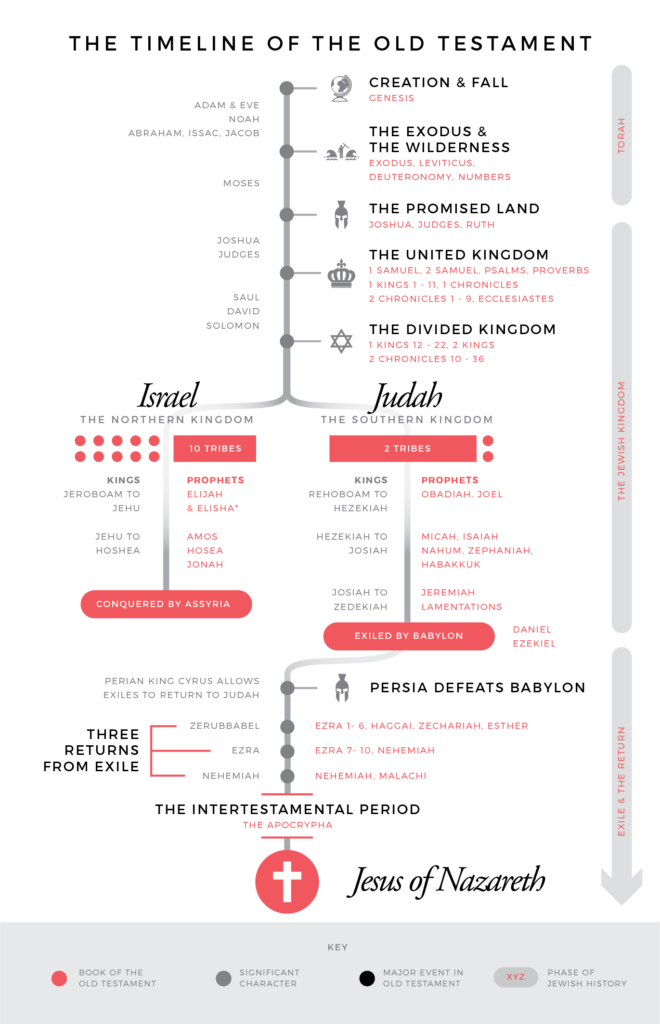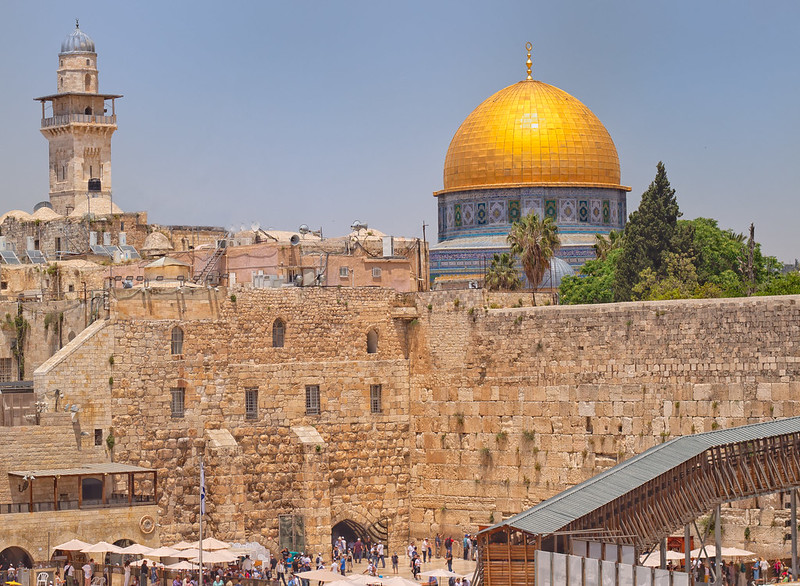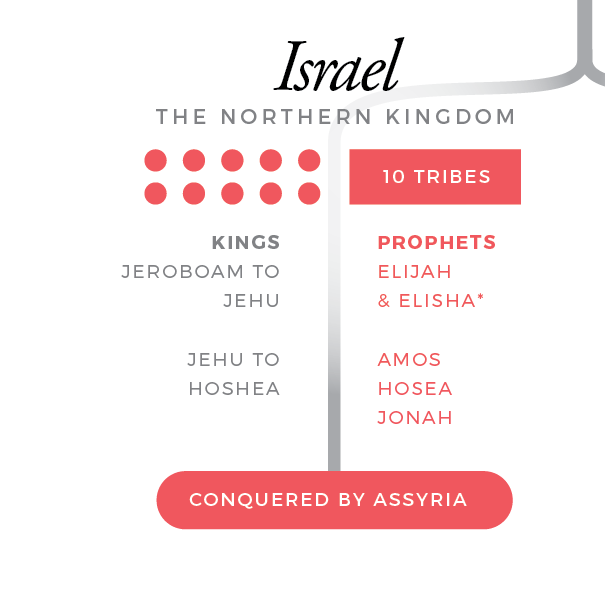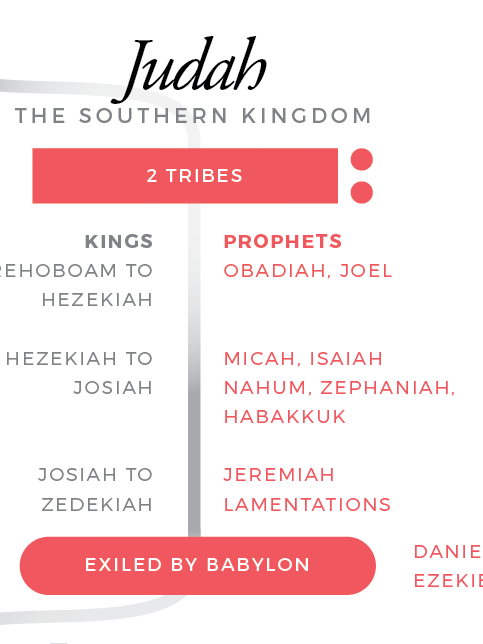The Torah (first five books of the Bible) is the founding story at the heart of Judaism. It describes the creator God Yahweh who rescues his people from slavery in Egypt in order to give them a family and a home. As God’s people live in Canaan, they form a nation that grows in might and prosperity, forming a united kingdom under the rules of the great kings of Israel: David and Solomon. However, the nation of Israel fractures into civil war, and ultimately is crushed at the hands of the empires of Assyria and Babylon as God’s people end up losing their land and getting carted off into exile. This section is called Kingdom – the Rise and Fall of God’s People.
From Torah to Kingdom
As the diagram shows, we have made it past the Torah, we move into the Promised Land with Joshua at the head of God’s People, the Israelites into Canaan, but soon will become the Jewish Kingdom of Israel.

Joshua & The Judges
Following Moses’ sermon in Deuteronomy, he hands the baton of leadership to Joshua, who follows God’s lead and marches the Israelites into Canaan. He sets up a government consisting of civil leaders called judges. However, the twelve tribes of Israel rebel and the promised land becomes a brutal, territorial and selfish nightmare. What starts as hopeful and courageous in the book of Joshua ends in corruption, conflict and idolatry at the end of Judges.
The Kings
Fortunately, the final judge of Israel is a righteous man named Samuel. He anoints Saul as the first king of Israel. Power hungry and insecure, God removes him from office and elects David, the most faithful, flawed and famous king in the Bible. Famously titled the ‘man after God’s heart’ (1 Sam 13:14), David brings the tabernacle, i.e. the dwelling place of God and places it in Jerusalem. What does David build to house the tabernacle? The Temple.
The Temple: Where Heaven Meets Earth
The temple is a major Israelite landmark. Jews from all over the world still make pilgrimages to the site of the temple (aka the Western Wall) today, because they believe it is where heaven and earth meet. No more meetings on Mount Sinai, no more pillars of fire and smoke, no more altars; God has a home – the Temple.

And as David builds a house for God, God vows to build a house for David. He makes a covenant that through David’s line will come a king that ‘shall establish the throne of God forever’ (2 Samuel 6 – 7). Though David’s reign as king is marred with infidelity (2 Sam 11), coups from his own family (2 Sam 14) and the death of several children, David extends Israel’s borders, defeats the enemies of the region and worships God unlike any king before or after. He even writes several Psalms: songs and poems to God which are greatly cherished, sung and prayed by Christians and Jews alike.
David’s son and successor, Solomon, completes David’s dream of building the Temple (1 Kings 6 – 9). In his dedication of the building, he quotes David and Moses, hammering home the significance of those covenants. builds tremendous trade agreements with surrounding nations which leads to the prosperity of Israel. Under Solomon, Israel reaches the peak of its power, wealth and land (1 Kings 8 – 10).
The Kingdom Split
Seduced by power and lust for non-Israelite women, Solomon becomes unfaithful to God. His successor Rehoboam deals unjustly with his countrymen by making them pay heavy taxes and so the United Kingdom of Israel descends into civil war. Israel splits into the Northern Kingdom (10 tribes), called Israel (confusing I know!) and the Southern Kingdom (2 tribes), called Judah (1 Kings 12). The capital of the north is Samaria, and the capital of the south is Jerusalem. This is why the book of Kings is named as such; it describes the reigns of the Israelite kings of the North, and the Judahite kings of the South.
Oldtidens_Israel_&_Judea.svg: FinnWikiNoderivative work: Richardprins, CC BY-SA 3.0 <https://creativecommons.org/licenses/by-sa/3.0>, via Wikimedia Commons
The Northern Kingdom of Israel
When we look at history, the northern kings make Israel a rich and powerful nation, primarily due to polytheism, clever economic practices and compromise. They honour forbidden gods, start forbidden practices and carry out business that God forbids. I find that it’s helpful to split the Northern kingdom into two phases: a.) Jeroboam to Jehu b.) Jehu to destruction.

Jeroboam to Jehu
Starting with Jeroboam, Israel’s kings are clever, cunning but ultimately, idolatrous. From King Jeroboam to the Kings of Jehu’s family, Israel reaches its peak of power and furthest extent of land. Unwilling again to forsake his people, God sends several people to encourage them to follow the light of the Torah. These spokespeople are known as prophets. In this first phase of Israel, God sends Elijah and Elisha. Through preaching, healing and divine judgement, they lead Israel away from worshipping Baal.
Jehu to Destruction
It’s important to note that at the time of the kings, there are two massive superpowers. Initially, Assyria and then after 605 BC, Babylon. During the time of the Northern kingdom, Assyria is the big fish in the pond, which means lesser kingdoms form alliances and treaties to avoid getting swallowed. Prophets during this final phase include Hosea, Jonah and Amos.
Hosea likens Israel’s relationship to God like a prostitute’s relationship to her husband, yet God always chooses to forgive and bring her home. Jonah is a prophet sent to show God’s love and forgiveness to Assyria. Finally Amos’ message is one of the coming judgement of Israel for its injustice, and the hope that God would restore a new family after destruction.
Despite the prophets’ warnings, Israel’s diplomacy, aggressive agricultural practices that trampled the poor and idolatry, ultimately leads to its downfall. After years of paying tribute to Assyria, King Pekah decides not to pay anymore ‘please-don’t-kill-us’ tax, and Assyria ransacks the entire kingdom. The ten tribes are assimilated into Assyrian life, and are lost forever.
The Southern Kingdom of Judah
If Israel’s kings go from bad to very bad, Judah’s kings are a mixed bag. I like to split the kings of Judah into three sections: Rehoboam to Hezekiah, Hezekiah to Josiah, Josiah to Exile.

Rehoboam to Hezekiah
Judah, the poorer of the two kingdoms, spends much time in conflicts with surrounding nations, vying to become an established power and looking to conquer Israel again and re-unite the kingdoms. Encouraged by prophets like Joel, Isaiah and Micah, Judah stamps out idolatry by the time we get to Hezekiah. Under his reign, he resists Assyrian conquest, but does pay tribute to the empire.
Hezekiah to Josiah
As refugees from Israel pile into Judah, and the economy is ravaged by Assyria’s conquest, Manasseh inherits a kingdom under considerable pressure. Perhaps in an effort to restart the economy, Manasseh allows Assyrian culture into Judah. He rebuilds altars to idols, factories that produce precious olive oil and even sacrifices his own son in devotion to foreign gods. A shrewd tradesman and loyal vassal to Assyria, Judah becomes prosperous and peaceful. His son Amon follows in his idolatrous footsteps and it looks like Judah is going the way of Israel, until Josiah, the final righteous king of Judah, steps in to save the day.
Josiah to Exile
King Josiah comes to power as the world superpowers are shifting: Assyria gives way to Babylon. Correcting the wrongs of Manasseh, Josiah and the high priest Hilkiah reform Judah, making worship of Yahweh and the centrality of the Bible important again. But, the reformation is short lived. After being tragically killed in a battle with Egypt, Josiah’s three sons and grandsons become the final kings of Judah. As Jeremiah and 2 Kings both attest, they did evil in the eyes of the Lord. God sends Habbakuk, Zephaniah, Jeremiah and Ezekiel with warnings of Babylon’s coming, yet promises that God will bring his Messiah and restore shalom through his people in exile.
Remember, God wants a people, with a place, carrying his presence in order to bring the wider world back into relationship with him (just like in the garden). Just like Israel, Judah doesn’t listen to the prophets and is conquered by Babylon in 597 BC.
They are taken to live in Babylon.
The temple of God’s presence is destroyed and God’s people are led away from God’s promised place into exile. Among the prisoners are a young man called Daniel, and a priest named Ezekiel.






